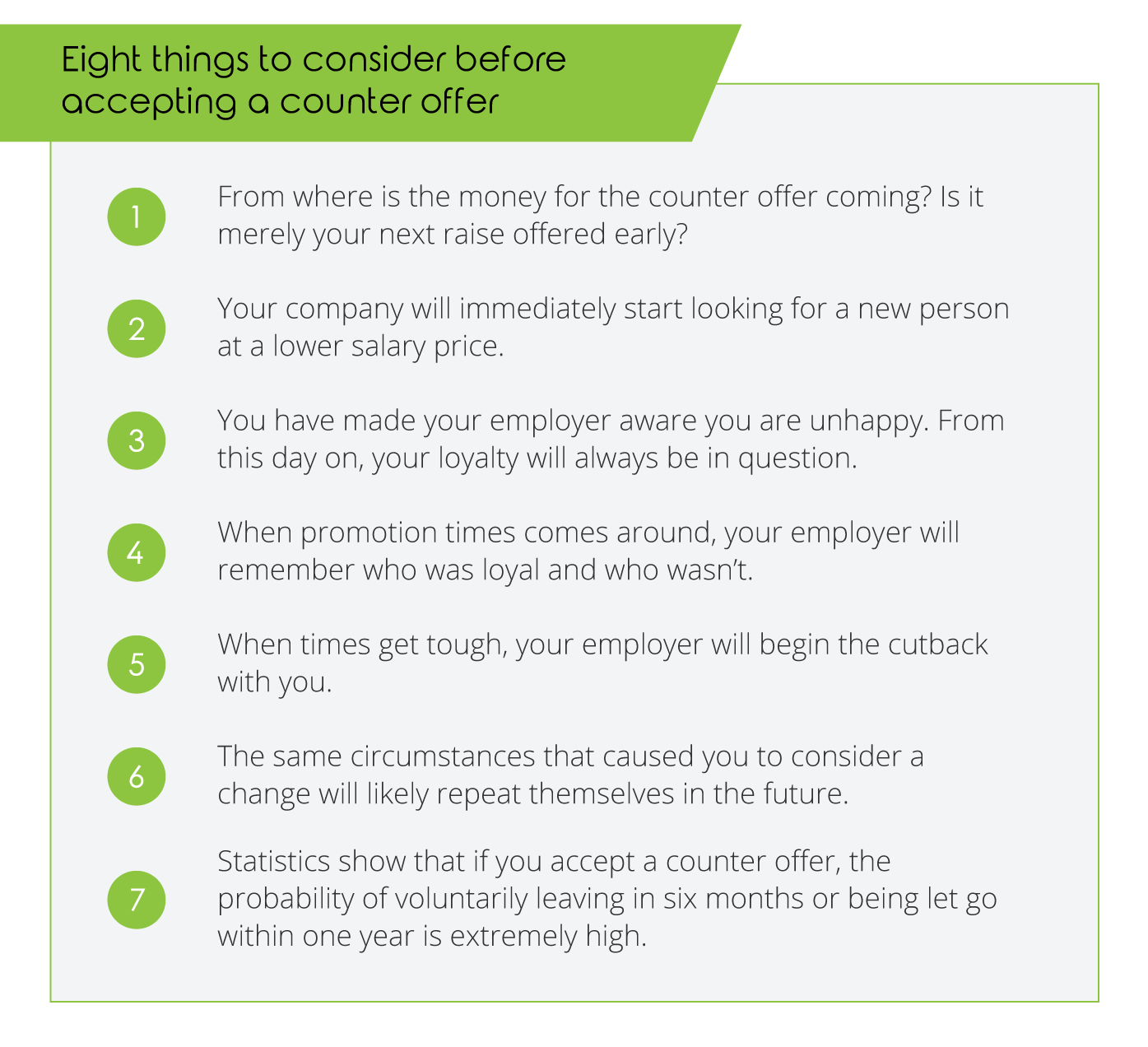The Truth About Counter Offers
You’ve interviewed for a position with a new company. The company likes you and makes you an offer. You take the time to analyse everything – career development, growth potential, salary, benefits and intangibles – and after some thought, you decide to accept the offer. However, when you attempt to resign from your current company, it doesn’t go as smoothly as you planned. Your boss is upset about losing you and presents you with a counter offer in an attempt to persuade you to stay.
What do you do?
Read on to find out the truth about counter offers and why, in most cases, accepting a counter offer is rarely a good idea.
“Where’s the Restroom?” Syndrome
No doubt about it, change can be scary. Employment changes are journeys into the unknown and often lead to feelings of risk, challenge, adventure and, possibly, fear. It’s natural to have anxiety about leaving a comfortable position “where everyone knows your name”. You’re familiar with the strengths and weaknesses of the company, how the office mail system works, what constitutes a lunch “hour” and where the washrooms are.
When considering a counter offer, don’t let familiarity cloud your judgment. Ask yourself whether the new position is a positive step towards advancing your career. Will it be better for you than your current position? If the answer is yes, then proceed with pursuing the position. Familiarity will follow!
Why Companies Make Counter Offers
Some companies never make counter offers and in others, it’s a fairly common practice. Consider what happens when an employee (like you) resigns:
First, morale is likely to suffer, particularly among your closest co-workers. Management will notice, and your resignation may be perceived as an unfavourable reflection on your boss. Your absence could jeopardise the progress of a big project, lead to increased workloads for colleagues who remain behind, and even mess up vacation schedules! Furthermore, it could be expensive (in terms of time, energy and money) to replace you.
A cheaper “solution” for the company is to make you a counter offer. This may consist of a raise, a promotion, change in title or job description, or a combination of these factors. It may even be just a promise of change to come.
Be aware that this “solution” may actually be a stalling technique. By buying you back, the company has bought itself some time, perhaps to finish that big project, reorganise other team members or search for a suitable replacement for you.
What Does a Counter Offer Sound Like?
Because your company wants to attract you to stay, a counter offer will usually come cloaked in flattery. It may sound something like this:
- “But you know we’re right in the middle of a big project! You’re much too valuable to the team to desert us now!”
- “We didn’t want to tell you until next quarter, but we were just about to give you a raise/promotion to show you how much we appreciate your work. Why don’t we make it effective immediately instead of having you wait any longer?”
- “We had no idea you were unhappy with anything here. Let’s discuss this further before you make a rash decision. Whatever it is, we can work it out.”
- “You know we have great plans for you here! But the company you’re going to work for? What can they do for you?”
Understandably, counter offers can be tempting and ego-inflating. You also may detect an underlying threat that by not accepting the counter offer, you’ll be throwing away your entire career, future, life.
Why Counter Offers Don’t Work
It’s true: counter offers very rarely work. There are several reasons for this, but one of the biggest ones is trust. No matter what the company says, you will forever be a “marked” employee. You have demonstrated your lack of loyalty by considering another opportunity. People will feel jilted, even if you accept a counter offer and stay. Trust and acceptance among your immediate colleagues may be irrevocably lost. Managers, too, have long memories, and won’t forget your lapse in loyalty, no matter how brief it may have been.
At the same time, it’s likely that your basic reason(s) for thinking of leaving will eventually resurface. There is a myriad of reasons why you may have considered a change – perhaps something in particular bothered you about your position, or maybe you were presented with an irresistible opportunity. Regardless, changes made as a result of a counter offer may appease you in the short term but rarely last for the long run. Statistics show that if you accept a counter offer, there’s a high chance that you’ll voluntarily leave or be terminated within six months to a year.
Similarly, while it may be true that your current company values your work, your interests and career will always be secondary to that of your boss, and way down on the totem pole compared to the company’s profit or survival. Reconsider the flattery that often makes up a counter offer – is it really about you?
In addition, if your counter offer involves an increase in money, consider the source of the raise. Is this just your next raise, granted early? In that case, will the counter offer simply prolong your review cycle? Remember that all companies have budgets that include strict wage and salary guidelines.
If you’re still unsure whether it’s wise to accept a counter offer, here are some thoughts to keep in mind.
What You Can Do?
Rather than setting yourself up for the feelings of confusion and guilt that may arise when a counter offer is presented, be prepared and know how to turn down a counter offer gracefully. When resigning:
- Avoid any possible misunderstanding by submitting your resignation in writing.
- Focus on the positive opportunity you’ve been offered with your new company. At your resignation meeting, don’t feel pressured into giving reasons for resigning. Simply state that you’ve been presented with an opportunity that you cannot pass up.
- Handle your resignation right the first time you do it. Be professional and courteous, not disgruntled or weak. Offer to help during the transition time, then follow up with your best effort.
Then, after you’ve done all that you can, move forward!
Look ahead to your new opportunity, complete with fresh challenges and all the excitement that goes with the start of any journey. Good luck!
For more counter offer advice or help with the search for your next job opportunity, get in touch with our team today.









